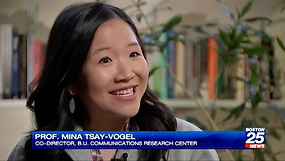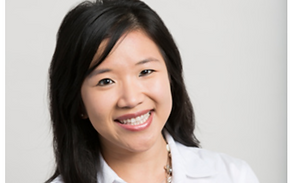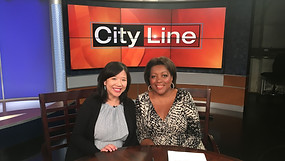MINA TSAY-VOGEL, Ph.D.


I'm a UX Research Manager at Meta, formerly a tenured Associate Professor at Boston University, passionate about understanding people's needs, motivations, and behaviors to build technologies that meaningfully enrich their lives and support their well-being. With more than twenty years of experience leading and conducting research in media psychology, directing a large-scale research lab, and teaching, mentoring, and advising students, I'm deeply invested in bridging industry and academia. As a mom of young kids, I'm truly grateful to have a career where I can leverage my expertise and dedicate my energy to making the world better for the next generation.

EXPERIENCE
2025-Present
Facebook Trust & Safety, Facebook
2022-2025
Metaverse, Reality Labs

User Experience Research Manager
-
Manage, mentor, coach, hire, and build strong teams of quantitative, mixed-methods, and qualitative researchers.
-
Coordinate roadmapping efforts across orgs, pillars, and product teams that facilitate cross-functional collaborations and alignment with engineering, product management, design, data science and engineering, and marketing to help inform prioritization and product strategies and decisions.
-
Activate and apply UXR insights to drive product development and inform business priorities, goals, and vision for products.
-
Serve as trusted, strategic leadership partner to key stakeholders across the company by communicating and demonstrating the value of user research to deliver insights that drive product and organizational impact.
-
Identify critical gaps, opportunities, and solutions for future growth and scale (e.g., system, product, cross-functional partnership, culture, and business opportunities) through research.
2009-2022
College of Communication

Associate Professor (tenured)
Associate Professor, Boston University | Media Science (tenured, 2018 – 2022), Assistant Professor (2011 – 2018), Visiting Assistant Professor (2009 – 2011), Boston, MA
-
Designed, led, executed, and published rigorous research at the intersections of communication, technology, and social psychology drawing empirically based conclusions about the psychological and social experiences of media users.
-
Developed and managed 300+ research teams examining processes and effects of media on user engagement, presence, enjoyment, well-being, empathy, sense of community, empowerment, identity, and prosocial actions.
-
Instructed courses in quantitative and qualitative research methods, sampling, statistics, data analysis, communication theory, media effects, and psychology of emerging media.
-
Recruited and mentored 1,000+ students in research design, implementation, analysis, and reporting, as well as professional development.
2015-2020
Communication Research Center

Co-Director
-
Directed College’s media lab which addressed theoretical and applied communication issues through advanced research design, methods, and analysis.
-
Developed research spaces for measurement/stimulus development and data collection/analysis via state-of-the-art technology (e.g., biometrics, virtual reality lab).
-
Hired, supervised, and trained 20+ staff members to operate and develop the center.
-
Increased efficiency of the research process by establishing a college-wide research participant pool facilitating 125+ research studies and 11,000+ study sessions.

EDUCATION
2003-2007
Pennsylvania State University

Ph.D. Mass Communication (Media Effects)
Concentrations: media psychology, statistics, social psychology
Dissertation: Is watching others self-disclose enjoyable? An examination of the effects of information delivery in entertainment media
Chair: Mary Beth Oliver, Ph.D.
1998-2002
University of Michigan

B.A. High Honors, Communication Studies
Concentrations: media effects, quantitative methods
Thesis: Interpersonal needs for inclusion, control, and affection and Internet use
Chair: Kristen Harrison, Ph.D.

RESEARCH
My research has systematically examined the effects of media on people's emotions, cognition, and behaviors, drawing from theories in communication and social psychology and using largely quantitative methods such as experiments, surveys, and content analyses. Below highlights three major bodies of work (see my Google Scholar profile).
Social Media Use & Effects
My research has investigated the uses and effects of social media by applying media theories such as third-person effects, cultivation, and framing to new technologies. Specifically:
-
Supporting the notion that third-person effects extend beyond traditional media to platforms such as Facebook (Tsay-Vogel, 2016). Not only did users report stronger Facebook effects on others than themselves, but also the perceived nature of Facebook as a positive social medium moderated these third-person effects.
-
Applying cultivation theory to explain how heavy consumption of Facebook over time shapes users’ social reality perceptions regarding privacy (Tsay-Vogel, Shanahan, & Signorielli, 2018). Across a 5-year period from 2010 to 2015, this longitudinal study revealed that Facebook cultivated more relaxed privacy attitudes, consequently increasing both offline and online self-disclosure.
-
Applying theories of media framing to examine the coverage of Twitter by mainstream news media, showing that stories covering Twitter since its inception were more likely to discuss benefits of Twitter by highlighting its positive social, communicative, political, and participatory impact (Chung, Tsay-Vogel, Kim, 2015).
Morality & Media
My research has examined how narratives featuring different character archetypes influence moral judgment. Specifically:
-
Demonstrating how narrative elements (e.g., character motivations and outcomes, justification of violence) and audience elements (e.g., story exposure, perceived character similarity) (Hartmann, Krakowiak, & Tsay-Vogel, 2014; Krakowiak & Tsay-Vogel, 2013; Sanders & Tsay-Vogel, 2016; Tsay-Vogel & Krakowiak, 2011) encourage pardoning immoral actions, increasing media enjoyment (Krakowiak & Tsay-Vogel, 2011; Tsay-Vogel & Krakowiak, 2016).
-
Showing that exposure to certain types of characters (e.g., good and morally ambiguous) can make people feel better about their own immoral behaviors (Krakowiak & Tsay-Vogel, 2015, 2018).
-
Demonstrating how reality programs that underscore moral virtue and lifestyle transformations uplift viewers and boost altruistic motivations (Tsay-Vogel & Krakowiak, 2016).
-
Finding that the desire to seek meaning from entertainment and its appreciation increases fan engagement (Tsay-Vogel & Sanders, 2015), strengthening perceived membership in, contribution to, and meaning attributed to fan communities (Tsay-Vogel, Lin, & Tsai, 2017).
Media Enjoyment & Appreciation
My research has focused on the emotional, cognitive, and behavioral components of media enjoyment and appreciation. Specifically:
-
Showing that positive and supportive behaviors exhibited during reality television were strongly predictive of future viewing intentions (Tsay-Vogel & Nabi, 2015).
-
Supporting the interactive and voyeuristic appeals of such programs, leading audiences to experience different levels of enjoyment across program subgenres (Tsay-Vogel & Krakowiak, 2017).
-
Finding that disclosure of personal information by characters vs. a narrator, increases enjoyment through character identification and narrative transportation (Tsay-Vogel & Oliver, 2014).
-
Assessing the influence of viewers’ personalities, interpersonal needs, and television motives on parasocial interactions (Tsay & Bodine, 2012), and produced a media character typology of parasocial relationships based on perceived authenticity (Tsay-Vogel & Schwartz, 2014).
-
Demonstrating how social comparisons with characters induce enjoyment and appreciation, spurring positive reappraisal of and perceived control over distressing life situations (Kim & Tsay-Vogel, 2016).

TEACHING
I have taught a variety of undergraduate and graduate courses (ranging from small seminars to large lectures) on the following topics:
Communication Research
Social Processes and Effects of Mass Communication
Experimental Design & Measurement
Media Effects
Psychology of Emerging Media
Sampling Design & Measurement Techniques
Entertainment Psychology
Communication Theory

MEDIA APPEARANCES
I have 50+ media appearances with my research featured in outlets such as The New York Times, The Wall Street Journal, and CNN. Below are a few examples of these features:
Featured on WGBH by Craig Sandler, about research assessing physiological responses to top presidential candidates (March 2, 2020).

Featured on Boston 25 News by Christine Swartz, about the effects of binge-watching and nature of violence in commonly binge-watched programs (March 27, 2019).

Featured in The Brink by Michael Goldberg, about the effects of social media use on privacy attitudes and behaviors (October 3, 2016).

Featured in The Brink by Lara Ehrlich, about the appeal of morally complex characters in entertainment media” (April 26, 2016).

Featured on WCVB-TV’s CityLine with Karen Holmes Ward, about the release of Wonder Woman and the increasing diversity within the superhero genre (June 11, 2017).

Prof. Tsay-Vogel talks about the importance of teaching students to be critical thinkers and understanding how we are impacted by media messages.

Additional media appearances:
-
Featured in The COMmunicator, “What it’s like being a working-from-home mother of four during the pandemic: An interview with Associate Professor Mina Tsay-Vogel” by Wanrong Lisa Qi, about pandemic life as a working mom (November 12, 2020).
-
Featured in The Brink, “What voters’ sweat levels, facial expressions, reveal about their feelings for candidates” by Art Jahnke, about recent biometric study measuring voters’ feelings about presidential candidates (March 2, 2020).
-
Featured on WGBH, “’BU biometrics study finds Sanders generates most intense emotional response in voters” by Craig Sandler, about recent study assessing physiological responses to top presidential candidates (March 2, 2020).
-
Featured in State House News Service, “’Biometrics study respondents feeling the Bern pre-primary” by Craig Sandler, about recent study using cutting-edge technology to measure reactions to presidential candidates (March 2, 2020).
-
Featured in International Business Times, “How Netflix binge-watching can change your worldview” by IANS, about recent study on the effects of commonly binge-watched programs on social reality perceptions (April 21, 2019).
-
Featured on Boston 25 News, “BU study finds binge-watching may be influencing you” by Christine Swartz, about the effects of binge-watching and nature of violence in commonly binge-watched programs (March 27, 2019).
-
Quoted in BU Today, “Brazen or cautious? Two seniors, two approaches to social media: The debate over sharing too much vs too little” by Megan Woolhouse about the effects of personal information disclosure on social media (March 19, 2019).
-
Featured in BU Today, “Does binge-watching Netflix warp your view of the world?” by Madeleine O’Keefe, about recent study examining violence in commonly binge-watched programs and its effects on mean and kind world perceptions (March 6, 2019).
-
Featured in Pacific Standard, “Binge-watching can warp your view of the world” by Tom Jacobs, about recent study examining violence in commonly binge-watched programs and its effects on mean and kind world perceptions (January 23, 2019).
-
Featured in State House News Service, “’Not just what your mouth says’: BU center goes beyond conscious responses” by Craig Sandler, about the study of physiological responses to media messages in the Communication Research Center (January 21, 2019).
-
Featured in BU Today, “Charles River Campus has 26 new associate professors” about faculty promotions to the rank of associate professor (June 14, 2018).
-
Featured in COMtalk, “How to convince a climate change skeptic” by Andrew Thurston, about the effects of proximity of an ecological event and complexity of scientific language on climate change perceptions (Fall 2017).
-
Featured on WCVB-TV’s CityLine with Karen Holmes Ward, about the release of Wonder Woman and the increasing diversity within the superhero genre (June 11, 2017).
-
Quoted in Toronto Star, “Wanted: Really good villains” by Raju Mudhar, about the appeal of morally ambiguous characters (May 28, 2017).
-
Featured in The COMmunicator, “BU’s Communication Research Center welcomes all” by Emma Park, about recent updates to facilities and technologies in the Communication Research Center (October 31, 2016).
-
Featured in BU Today, “COM Prof’s study sheds light on undergrad Facebook habits” by Michael Goldberg, about the effects of social media use on privacy attitudes and behaviors (October 3, 2016).
-
Featured in Now, “TV antiheroes like Cersei and Dexter enthrall us. Here’s why” by Robert Lamb, about the reasons we are drawn to morally ambiguous characters (April 2016).
-
Featured in Futurity, “Why we root for characters who do bad deeds” about the reasons we are drawn to morally ambiguous characters (April 2016).
-
Featured in COMtalk, “Allure of the antihero” by Lara Ehrlich, about the appeal of morally complex characters in entertainment media” (Spring 2016).
-
Featured in BU Today, “#Screentime Conference” about the unique and evolving phenomena of individual and collective experiences with emerging media platforms (July 2, 2015).
-
Featured in The COMmunicator, “Above the media’s influence: Dr. TV’s latest study on third-person effects” by Ann Schirrmeister, about published research on third-person effects in the context of Facebook (March 17, 2015).
-
Quoted in The Daily Free Press, “Advertising targets college demographic using social media to build relationships” by Meagan Dawson, about the ways in which advertising appeals to college students’ psychological and social needs and desires (September 29, 2014).
-
Featured in BU Today, “East meets west online” by Richard Barlow, about the College of Communication’s new online workshop for incoming Chinese graduate students (July 11, 2014).
-
Quoted in TeenLife, “The reality of reality TV” by Kimberly Spector Wolf, about the effects of heavy exposure to reality TV on people’s social reality (September 19, 2013).
-
Quoted in Fast Company, “Why we love TV’s most deeply flawed characters” by Jennifer Miller, about the appeal of morally ambiguous characters (April 5, 2013).
-
Quoted in The Sun Chronicle, “Tech difficulties” by Andrea Vale, about self-disclosure on Facebook and Internet personae (January 8, 2013).
-
Quoted in Boston Herald, “New social network blends best of Facebook, Twitter, and Tumblr” by Jed Gottlieb, about the prospects of the new social networking site, Pheed (November 4, 2012)
-
Featured in USA Today, “Top universities and professors for 2011-2012” by Patrick Foster, listed as one of the top 25 ranked professors on RateMyProfessors.com (August 29, 2012).
-
Quoted in Boston Globe, “Time to come clean as soon as possible: Crisis management requires fast action in era of social media” by Stephanie Steinberg, about the risk of misinformation being channeled when using social media (August 2, 2012).
-
Quoted in Boston Herald, “Salt-and-ice dare draws warnings from medical experts” by Tenley Woodman, about the popularity of novel videos posted in social media (July 16, 2012).
-
Quoted in Entertainment Weekly, “I’m not here to make friends: Why reality TV’s smartest stars love to be hated” by Lanford Beard, about the strategic use of underhanded conduct on reality TV programs (July 12, 2012).
-
Quoted in Greatist, “Why we’re obsessed with reality TV” by Nicole McDermott, about the effects of consuming high doses of reality-based programming (July 11, 2012).
-
Featured in COMtalk (official biannual publication for alumni, parents and friends of Boston University’s College of Communication), “Researchers at COM are uncovering trends in communication, and highlighting new ways of business” by Andrew Thursday, about how television news frames Twitter (Spring/Summer 2012).
-
Quoted in Boston Herald, “Boston reacts to Wikipedia’s protest blackout” by Dan O’Brien, about reactions toward the Stop Online Piracy Act and Protect Internet Protocol Act (January 18, 2012).
-
Quoted in Boston Herald, “Facebook suicide intervention tool response mixed” by Dan O’Brien, about the new Facebook feature that lets users report suicidal content to website administrators (December 15, 2011).
-
Featured in Research at Boston University 2011 (official yearly research magazine at Boston University), “The face-time continuum” by James O’Brien, about current research on social media and reality TV on privacy perceptions (December 13, 2011).
-
Quoted in The National, “Now starring in TV’s prime time: The recessions” by Sonya Bell, about gratifications sought from recession-based reality TV shows (October 11, 2011).
-
Quoted in Boston Herald, “Fake tweets terrorize Twitterverse” by Dan O’Brien, about the phenomenon of fake tweets (September 30, 2011).
-
Featured on WCVB-TV evening news with Pam Cross, about the effects of Facebook’s new top story feature (September 21, 2011).
-
Quoted in Times Union, “Social media menu gets fuller: Entry of Google+ means even more potential for overload” by Kristi Gustafson Barlette, about the shift in expectations of communication dictated by social media (August 18, 2011).
-
Featured on Professor Voices: Opinions and Views by Boston University Experts, “Is Google+ the next Facebook?” (August 17, 2011).
-
Featured on New England Cable News evening news with Greg Wayland, “Bin Laden’s death sparks video game controversy” (May 9, 2011).
-
Quoted in CNN, “Why understanding online can work against you” by Eliza Ridgeway, about the disintegration in the boundaries of public and private in social media environments (April 13, 2011).
-
Quoted in The New York Times, “The footprints of web feet” by Austin Considine, about social media’s evolution in influencing privacy perceptions and a growing reliance on information, taste, and behaviors of other consumers (March 4, 2011).
-
Quoted in The Patriot Ledger, “Online threats pose a problem for police, schools and parents” by Christian Schiavone, about the limitations of adult monitoring children’s Facebook profiles (January 18, 2011).
-
Quoted in The Sun Chronicle, “Trolling for the grief-stricken” by Matt Kakley, about the absence of negative consequences of trolling (October 5, 2010).
-
Quoted in Boston Herald, “Web catches the lows of student life: Privacy a major worry” by Renee Dudley, about the commodification of people’s privacy online (April 25, 2010).
-
Featured on Fox 25 evening news with Sara Underwood, about the psychological and social effects of Chatroulette (March 30, 2010).
-
Quoted in BU Today (Arts and Entertainment), “Next: Chatroulette, face-to-face with strangers from anywhere, anytime” by Caroline Hailey, about Chatroulette’s social implications on privacy norms (March 22, 2010).
-
Quoted in The Wall Street Journal, “Small businesses develop taste for spotlight on reality TV shows” by Emily Maltby, about the voyeuristic nature of reality-based programming (January 26, 2010).
-
Quoted in Boston Teens in Print, partnered with The Boston Globe, “Are you addicted to Facebook?” by Cheila Martinez, about the prevalent use and psychological effects of Facebook on teenagers (November/December 2009).
-
Quoted in The Boston Herald, “New slang is totes ridic,” by Michael Marotta, about the use of slang in social media environments (November 18, 2009).
-
Featured in the Communication Research Podcast, a production of the Communication Research Center at the College of Communication at Boston University, discussing the affective, cognitive, and behavioral components of media enjoyment predicting overall enjoyment of programs (October 26, 2009).
-
Featured on WBZ-TV evening news with Jon Keller, about Polo Ralph Lauren controversy over computer-generated model (October 8, 2009).